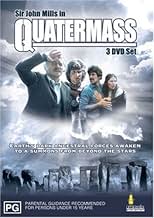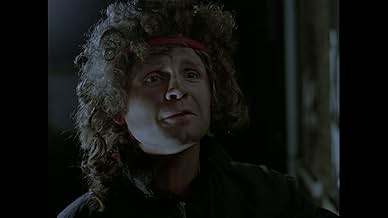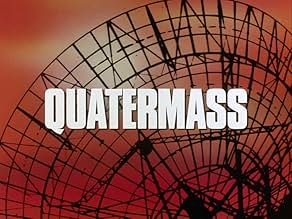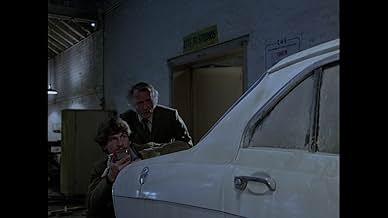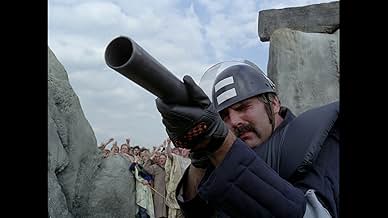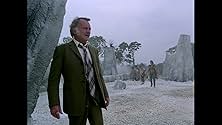In the distant future, a now-elderly Bernard Quatermass investigates the disappearance of his granddaughter and a mysterious cult.In the distant future, a now-elderly Bernard Quatermass investigates the disappearance of his granddaughter and a mysterious cult.In the distant future, a now-elderly Bernard Quatermass investigates the disappearance of his granddaughter and a mysterious cult.
Browse episodes
Featured reviews
The Quatermass Conclusion deals with an alien machine returning to the Earth after five thousand years to 'harvest' and stir-up the glandular secretions of humans which it then uses for it's own ends. Set in a near-future (in the 70s when it was released), the scene is an anarchistic, broken-down and violent vision of Britain, but none of the little touches are over the top enough to be classed as impossible. Prince Charles is on the throne, cars have number plates with 'v' on them and the Metropolitain Police are now privately contracted. Street crime, muggings and overall disorder are all the people know (oh no, it's all coming true!!) When the alien presence is identified as a threat rather than a religious saviour in a chilling Nigel Kneale trademark 'revelation of terror': the body parts in the ashes at Ringstone Round, Quatermass is employed in his quite usual role of leading science against politicians and the military machine to engage the menace. This seems to perk him up a little, when we see him first he is an old man broken down by the anarchy of society, depressed also that his work with the rocket group ended up being misused only for military ends. This is a very bleak piece which would depress viewers if it wasn't so busy chilling and terrifying the hell out if them with trademark Nigel Kneale 'terror revelations' and extremely succinct scientific concepts and valid predictions. Not only that, but it lays claim to having the most chilling and atmospherically terrifying aspect of all of the Quatermass films and serials, the spine-tingling refrain of 'huffity-puffity Ringstone Round'. I always only ever thought there were three Quatermass serials, Xperiment, II and Pit, up until about 4 years ago, when a conversation in a pub about there being another where 'people were being drawn to Stonehenge to be eaten' put me on the trail of this, and the first time I managed to get to see it after this revelation my blood ran cold at that nursery rhyme. I had a shudder just then recalling it.
I recently watched the complete four-hour version of Nigel Kneale's British miniseries "Quatermass." I had seen an edited movie version called "The Quatermass Conclusion" some years earlier. The verdict: The miniseries is superior. It expands on several subplots (of course) and offers richer characterizations. John Mills makes an excellent Quatermass--somewhat befuddled at the outset, but strong and clear of mind when the survival of the world is at stake. Granted, the production is not as polished as the movie version of "Quatermass and the Pit" (the music, in particular, sounds like it costs a couple of hundred bucks). But the ideas are intriguing and that darn nursery rhyme about Ringstone Round is still running around my brain. Kneale wrote a novelization of the miniseries that clarifies a few vague points.
I first saw this TV series as young child and it scared the hell out of me. Having recently watched it again 38 years later I was amazed at how good it still is. The TV acting is stilted in places but it's budget was used to good effect to produce a world steeped in chaos and slipping towards an abyss. I certainly think the 2006 film 'Children of Men' was inspired in part by this mini-series.
Central to the plot is professor Quatermass who is called back from disgrace to investigate the mass extermination of young people at pre-historic sites around the world. The budget barely stretches to evoke all this, but none the less it delivers and the drama and sense of urgency in Quatermass is palpable.
What ultimately is examined is the sense of growing alarm and division between the older generation and the new age generation that emerged in the 1960's and evolved into Punk in the 70's. The film brackets this generational divide in a story that is compelling and tragic, and it has to be said the series wisely chooses to concentrate on the gravity and graveness of the situation rather than cheap mawkishness.
Secondary characters in Quatermass are deployed to good effect, and modern film makers should take note about how such characters can be used to fill out a plot and create interesting characters, rather than props or dumb cannon fodder. They are used well to bolster the sense of discovery and revelation about what is happening and treated with intelligence and compassion.
Across all it's outings Quatermass has always been a work of it's time and dealt with the themes of the era each was made in. This outing is no different and indeed a generation later it's message about the dislocation between generations still resonates. Cleverly Quatermass takes this, something that is a tangible concern in the real world, as the central theme of it science fiction story. Even though it was made in 1979 my kids who watched it this time around were as impressed and disquieted as I was at there age.
John Mills is excellent as Quatermass. Embracing his role he obviously drew on his age and paternal experience to inject the famous scientist with pathos and real focus.
There are stilted moments in Quatermass and the effects have aged a lot. But none of that can detract from a fine and brave science fiction mini-series.
Central to the plot is professor Quatermass who is called back from disgrace to investigate the mass extermination of young people at pre-historic sites around the world. The budget barely stretches to evoke all this, but none the less it delivers and the drama and sense of urgency in Quatermass is palpable.
What ultimately is examined is the sense of growing alarm and division between the older generation and the new age generation that emerged in the 1960's and evolved into Punk in the 70's. The film brackets this generational divide in a story that is compelling and tragic, and it has to be said the series wisely chooses to concentrate on the gravity and graveness of the situation rather than cheap mawkishness.
Secondary characters in Quatermass are deployed to good effect, and modern film makers should take note about how such characters can be used to fill out a plot and create interesting characters, rather than props or dumb cannon fodder. They are used well to bolster the sense of discovery and revelation about what is happening and treated with intelligence and compassion.
Across all it's outings Quatermass has always been a work of it's time and dealt with the themes of the era each was made in. This outing is no different and indeed a generation later it's message about the dislocation between generations still resonates. Cleverly Quatermass takes this, something that is a tangible concern in the real world, as the central theme of it science fiction story. Even though it was made in 1979 my kids who watched it this time around were as impressed and disquieted as I was at there age.
John Mills is excellent as Quatermass. Embracing his role he obviously drew on his age and paternal experience to inject the famous scientist with pathos and real focus.
There are stilted moments in Quatermass and the effects have aged a lot. But none of that can detract from a fine and brave science fiction mini-series.
This was Nigel Kneale's fourth and final Quatermass TV serial. The first three were also adapted into very good movies, this one wasn't, but it was edited down into a film, usually known as "The Quatermass Conclusion". I say avoid that and try and see this the full version, which goes for around 200 minutes. John Mills' Quatermass is very different from Andrew Keir's, Andre Morell's and most especially Brian Donlevy's Quatermass. Mills plays him as a tired and out of touch old man. The plot is set in the near future. Society has broken down, youth gangs roam the streets, while others known as "the planet people" wander the countryside. They are anti-science, anti-"progress" hippies who believe that they will one day be taken up and sent to another planet. I see some people criticise the planet people as being "out of date". These people seem to be unaware of the travellers/"crusties" phenomenon in Britain in the 1980s, and what about the "Heaven's Gate" cult of more recent years? Quatermass' granddaughter has run away from home, and while he searches for her he becomes involved with the planet people, a group of which seemingly are "taken" while congregating around some ancient standing stones. But this is only the beginning... to give away more of the plot would be a shame. The budget for this mini-series is obviously not all that large, and the special effects are modest, but they are generally pretty effective, the acting is good for the most part, and it contains an intelligence and darkness rarely seen in contemporary TV SF. 'Quatermass' has a few flaws but I think it is extremely underrated and a fine close to Kneale's Quatermass series.
I saw this series when first aired, when I was just a kid, and while I remembered little about the story, I did remember that it made more of an impression on me than most SF shows of the time. Now I can see why.
The setting is very much 'future 70s', with hippies, oil restrictions, social collapse, power cuts, and other fears of that era, the effects are certainly very old by modern standards, and Mills' Quatermass is too undeveloped and unsympathetic for my tastes. However, the story makes up for it, and there are some memorable ideas (like gladiatorial games in Wembley Stadium) and some memorable scenes (again, the Wembley Stadium 'harvesting' scene in particular, and the S&M 'family show' would also have been a lot more fun on Saturday night TV than Noel Edmonds).
One thing I hate about bad SF is that the aliens are just people with a few rubber bits stuck on their face, who come to Earth to kidnap women or steal our resources, or some other mundane and, frankly, very human goal. Quatermass' aliens, on the other hand, are never seen and we never even really find out quite what they're doing, just that they're extremely powerful and don't care about humans in the least... it's a far more intelligent premise, and very Lovecraftian, in a way.
So, the effects are dated, Quatermass himself could have done with more work and possibly a different actor, but overall it's an intelligent premise, and, frankly, the idea of an attack by hugely powerful aliens who care nothing for the human race is far more scary to me than most so-called 'horror' movies of recent years.
The setting is very much 'future 70s', with hippies, oil restrictions, social collapse, power cuts, and other fears of that era, the effects are certainly very old by modern standards, and Mills' Quatermass is too undeveloped and unsympathetic for my tastes. However, the story makes up for it, and there are some memorable ideas (like gladiatorial games in Wembley Stadium) and some memorable scenes (again, the Wembley Stadium 'harvesting' scene in particular, and the S&M 'family show' would also have been a lot more fun on Saturday night TV than Noel Edmonds).
One thing I hate about bad SF is that the aliens are just people with a few rubber bits stuck on their face, who come to Earth to kidnap women or steal our resources, or some other mundane and, frankly, very human goal. Quatermass' aliens, on the other hand, are never seen and we never even really find out quite what they're doing, just that they're extremely powerful and don't care about humans in the least... it's a far more intelligent premise, and very Lovecraftian, in a way.
So, the effects are dated, Quatermass himself could have done with more work and possibly a different actor, but overall it's an intelligent premise, and, frankly, the idea of an attack by hugely powerful aliens who care nothing for the human race is far more scary to me than most so-called 'horror' movies of recent years.
Did you know
- TriviaStarted life in 1973 as a BBC series called "Quatermass IV". It had been commissioned by Head of Drama Ronald Marsh, and according to Nigel Kneale, the intended producer was Joe Waters. Some model test sequences of the space station were shot, but eventually, the project was abandoned by the BBC. ITV then picked it up a few years later and produced it in association with Euston Films.
- Alternate versionsThis has been made available in the United States in two versions. It was first released edited down to a 105 minute feature film under the title The Quatermass Conclusion (1979). In 2003 the complete program was released on home video under the title "Quatermass" with a listed running time of 240 minutes.
- ConnectionsEdited into The Quatermass Conclusion (1979)
- How many seasons does Quatermass have?Powered by Alexa
Details
Contribute to this page
Suggest an edit or add missing content

